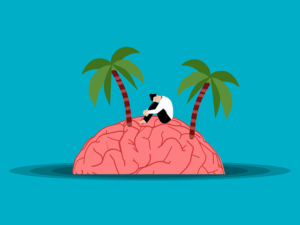
It’s difficult to spell out exactly what social anxiety feels like to someone that hasn’t experienced it.
Social anxiety is an oppressive, constant fear of judgment or embarrassment in social situations.
As Success and Leadership Coach Christine Hourd puts it, “Social anxiety, also referred to as shyness, is like being put under a microscope in the presence of others, and creates this fear of being judged or criticized for your actions and behavior. This feeling is so intense that it keeps you from speaking or taking action the way you would when relaxed.”
Social anxiety is most often characterized by irrational anxiousness in an otherwise mundane social situation.
Physical symptoms include shaking, sweating, rapid heartbeat, dizziness, and nausea, while emotional symptoms manifest as self-consciousness around others and sometimes even a feeling of dissociation.
Social Anxiety Disorder needs must be specifically diagnosed by a medical professional, so if you or anyone in your life exhibits the symptoms associated with social anxiety, seek an evaluation.
Social anxiety symptoms manifest in a number of different situations.
Social anxiety can be crippling in all manner of social encounters, including work or school, job interviews, familial gatherings, parties, and the like.
Social anxiety can cause an otherwise mundane or enjoyable social encounter to become a monumental test of wit and guile. The consequences for making a mistake in said social situations feel as though carry dire consequences of judgment, embarrassment, and draw undue attention.
You feel as though you have to carefully calculate and evaluate each and every word before you say it. “Was that a stutter? Do you sound like a liar? Everyone’s having fun conversations, how do I break into them without sounding like an idiot? I should check my phone, it’s been a few seconds since I last looked at it.”
What is especially cruel about social anxiety is that, like the fear of the dark, socially anxious people often know that their fears of social encounters are irrational. Unlike the fear of the dark, however, this awareness can make the anxiety worse.
By knowing that they have this irrational anxiety in social situations and limited ability to control it, anticipation and a fear of the fear can form. “Oh my God, I know I get anxious around new people, surely they’ll see that I’m nervous and judge me for it!”
The roots of social anxiety tend to go back to childhood.
As Clinical Hypnotherapist and Spiritual Life Coach Keya Murthy says, “Social anxiety is …….
Source: https://www.yourtango.com/2021345309/what-social-anxiety-feels-how-live-and-deal-social-phobia




